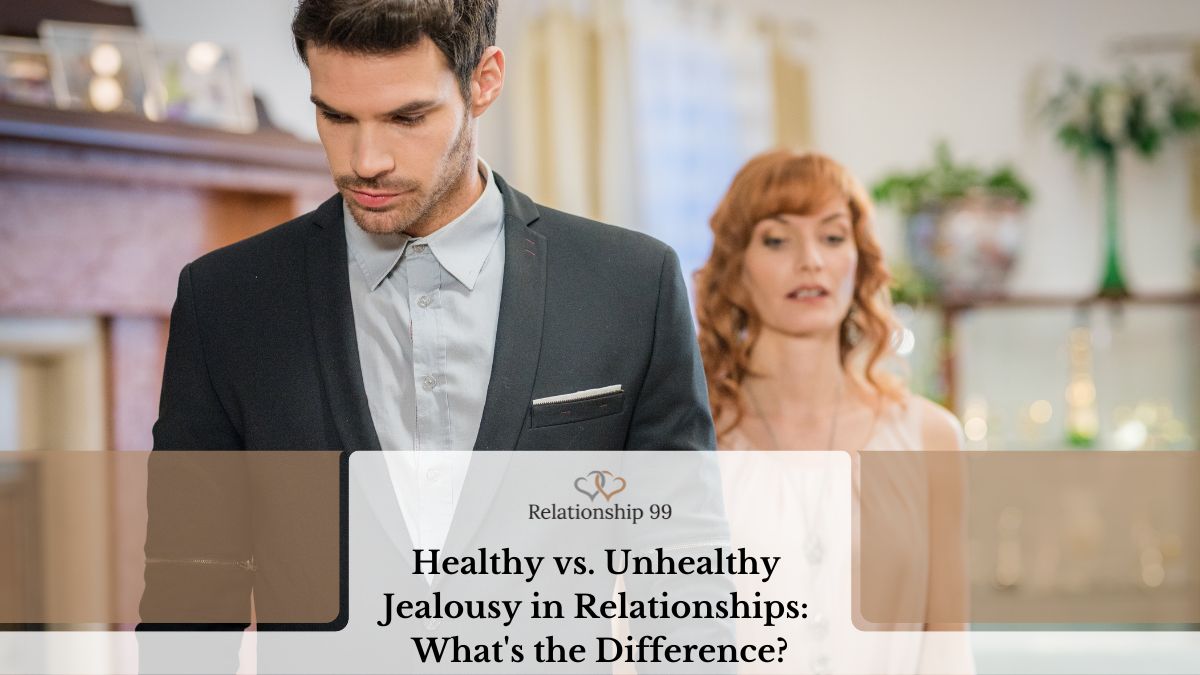Jealousy is a complex emotion that has been described as the “green-eyed monster” and a leading cause of conflict in relationships. It’s a common experience that has likely affected all of us at some point in our lives, whether it be romantic, familial, or even between friends. But not all jealousy is created equal. In fact, there are two distinct types: healthy and unhealthy.
Let’s dive into the differences between these two types of jealousy and how they can impact our relationships.
The Nature of Jealousy
Jealousy is a complex emotion that can stem from a variety of underlying factors, such as insecurity, fear, and low self-esteem. It often arises when we perceive a threat to something or someone we value, whether it be our romantic partner, friend, or possession.
While it is a universal emotion, the way we experience and express jealousy can vary greatly. Some individuals may experience mild jealousy that quickly dissipates, while others may struggle with intense and persistent feelings of jealousy. The intensity of our jealousy can also be influenced by factors such as past experiences, attachment styles, and underlying mental health conditions. So, as much as jealousy can be a normal reaction, it’s important to recognize when it becomes unhealthy.
Healthy Jealousy
Healthy jealousy can be described as a natural and manageable response to perceived threats in a relationship. It involves feeling a slight twinge of uneasiness or discomfort but not allowing it to consume your thoughts or actions.
This type of jealousy often arises from a place of love and concern for the relationship. For example, if your partner seems overly flirty with someone else, it’s natural to feel a bit jealous. However, in a healthy jealousy response, you are able to communicate your feelings calmly and rationally without resorting to accusations or controlling behavior.
Healthy jealousy also involves trust and respect for your partner. You may feel a pang of jealousy when they go out with friends or have a close relationship with someone of the opposite gender, but ultimately, you trust that they will remain faithful and loyal to you.

Unhealthy Jealousy
Unhealthy jealousy, on the other hand, is characterized by intense and irrational feelings of suspicion, possessiveness, and control. It often arises from insecurities and can quickly spiral into destructive behaviors that can damage relationships.
Individuals who struggle with unhealthy jealousy may constantly monitor their partner’s activities, check their phone or social media accounts, and question their every move. They may also resort to verbal or physical abuse, isolating their partner from friends and family, and even stalking.
Unhealthy jealousy can also be fueled by toxic societal beliefs such as “possessing” your partner or the idea that love should be full of drama. These beliefs only serve to perpetuate unhealthy patterns in relationships and can lead to feelings of resentment, insecurity, and mistrust.
The Impact on Relationships
While both types of jealousy may arise from a similar place, the impact they have on relationships is vastly different.
Healthy jealousy can actually strengthen a relationship by promoting open communication, trust, and mutual respect. It allows for honest discussions about boundaries and healthy ways to address any concerns or insecurities.
On the other hand, unhealthy jealousy can cause major rifts in relationships. It erodes trust, breeds resentment and insecurity, and can lead to controlling and abusive behaviors. In extreme cases, it can even escalate to physical violence. This type of jealousy often leads to toxic and unhealthy relationships that are built on a foundation of fear and control rather than love and respect.
Overall, there is a stark difference between healthy and unhealthy jealousy in relationships. While healthy jealousy can be manageable and even beneficial, it’s important to recognize when it crosses the line into unhealthy territory.
Understanding and Managing Jealousy
So, how can we navigate jealousy in our relationships and ensure it remains healthy? Here are some tips:
- Communicate: Open communication is key to addressing any concerns or insecurities that may arise. Be honest and non-judgmental when discussing jealousy with your partner.
- Recognize unhealthy patterns: If you find yourself exhibiting controlling or abusive behaviors in response to jealousy, it’s important to seek help and address the underlying issues.
- Build trust: Work on building trust in your relationship, both in yourself and your partner. This can involve setting boundaries, being transparent with each other, and practicing forgiveness.
- Practice self-care: Jealousy often stems from our own insecurities and low self-esteem. Take care of yourself and work on boosting your self-confidence.
- Reflect on past experiences: Our past experiences can greatly influence how we respond to jealousy. Reflect on any patterns or triggers that may be contributing to your feelings of jealousy.
- Seek professional help: If jealousy is causing significant distress in your relationship or daily life, it may be helpful to seek therapy and address any underlying issues.

Signs for the Receiving End
While jealousy can be managed and addressed by the individual experiencing it, it’s also important to recognize when you’re on the receiving end of unhealthy jealousy. Here are some signs that may indicate your partner is struggling with unhealthy jealousy:
- Constantly questioning your whereabouts or activities.
- Checking your phone or social media accounts without permission.
- Isolating you from friends and family.
- Being overly possessive or controlling.
- Blaming you for their jealousy and making you feel guilty.
- Verbally or physically abusing you.
- Stalking or monitoring your movements.
- Showing extreme jealousy towards platonic friends or coworkers.
If you notice any of these signs in your relationship, it’s important to have a conversation with your partner and set boundaries. If the behavior continues, it may be necessary to seek professional help or consider leaving the relationship for your own safety and well-being.
What Can a Receiving Partner Do?
If you find yourself in a relationship with someone who struggles with unhealthy jealousy, it’s important to take care of yourself. Here are some tips for managing the situation:
- Communicate openly and honestly: Share your concerns and boundaries with your partner calmly and clearly.
- Set boundaries: Let your partner know what behaviors are not acceptable to you and stick to them. It’s important to prioritize your own well-being.
- Seek support: Surround yourself with friends and family who can offer emotional support and a safe space to talk about what you’re going through.
- Seek professional help: Individual or couples therapy can be beneficial in addressing unhealthy jealousy in relationships. A therapist can provide a safe and neutral environment for both partners to discuss their feelings and work towards healthier patterns.
The Bottom Line
Jealousy is a complex emotion that can arise in any relationship, but it’s important to distinguish between healthy and unhealthy forms. Whether you’re experiencing jealousy or on the receiving end of it, communication, trust, and boundaries are key in navigating this emotion. Seeking professional help can also be beneficial in addressing any underlying issues and building healthier patterns in relationships. Remember to prioritize your own well-being and never tolerate abusive or controlling behaviors in the name of love. Healthy relationships are built on mutual respect, trust, and communication, so strive for those qualities in all your connections. And always remember, love should never feel like a possession or a constant struggle. It should be a source of joy, support, and growth in our lives!

